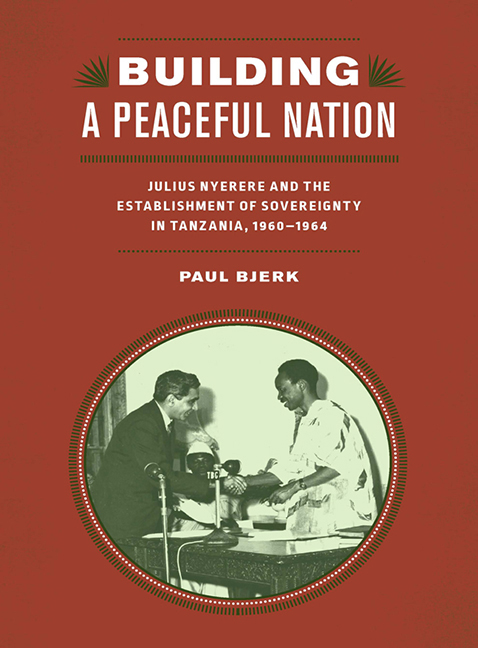 Building a Peaceful Nation
Building a Peaceful Nation 2 - Contemplating the Postcolony
Published online by Cambridge University Press: 08 May 2021
Summary
A former labor leader and politician, Peter Kisumo identified ethnic organizations, with their modernist and even democratic goals, as catalysts for nationalist organizations like Nyerere's party, the Tanganyika African National Union (TANU), or the Tanganyika Federation of Labour (TFL). He also noted their shortcomings. For Kisumo, the independence movement had to be a national one that took the colonial state as the basis for constructing postcolonial sovereignty:
Before we got to the national organizations, like trade unions, there were tribal organizations… . Some wanted to remove the chief, others gathered the strength of the tribe; and where could they take it? If you gather the strength of a tribe, you can only ask for independence. Ultimately independence could not be demanded from the chief, it had to come from the colonial power.
Local civil society associations offered models for organizational structures. But they also held the potential for divisive competition over what sorts of organizations would bear people's political aspirations, and over the nature of citizenship and authority that would guide the envisioned state. In reference to the ubiquitous efforts at ethnicity-based political mobilization in late colonial Tanganyika, John Iliffe concurred: “Nationalism not only grew up alongside other political tendencies; to a considerable extent it grew out of them.” Despite TANU's relatively understated ideology in the preindependence period, we need to understand what this dynamic meant in policy and discourse because, in Iliffe's view, “it was in altering men's perception of their interests that ideology was crucial to Tanganyikan nationalism.”
The impact of Nyerere's thought on political perceptions, as Iliffe suggests, was real. But accounts from observers such as Pratt who had a frontrow view of these events have uncritically presented Nyerere's developing political philosophy during this period without placing it in a historical chronology. More recent historians like Brennan have begun to develop a more critical account of events and have made inroads into the cultural and intellectual currents shaping their discursive context, especially the racialist tropes of economic exploitation that fueled many postcolonial political debates. A primary concern that emerged in the late 1950s was how to ensure that an independent government would be robust in the face of such potential divisions. Nyerere's main strategy for stability became the promotion of a one-party state.
- Type
- Chapter
- Information
- Building a Peaceful NationJulius Nyerere and the Establishment of Sovereignty in Tanzania, 1960–1964, pp. 34 - 58Publisher: Boydell & BrewerPrint publication year: 2015


